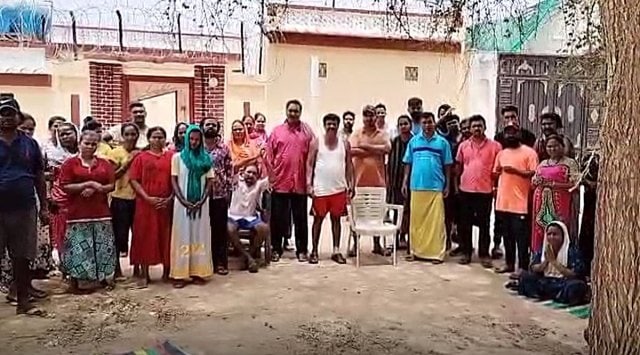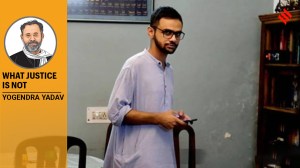‘No less than hell’: While Hakki Pikkis who made it out of Sudan thank govt, others stuck in faraway cities plead for help
Prabhu S, who is also from the Hakki Pikki community, lives in the Sudanese city of Al Fashir, around 1000 km away from Khartoum. He said that the firing, which had stopped for a couple of days, had now begun again.
 Indians stuck in Sudanese city of Al Fashir, around 1000 km away from Khartoum. (Screengrab)
Indians stuck in Sudanese city of Al Fashir, around 1000 km away from Khartoum. (Screengrab) “The bodies of those who died in the firings and bombings remain on the roads. Stray dogs are eating the flesh. It is no less than hell,” 55-year-old Ranjan said of Sudan’s capital Khartoum.
The Karnataka man was speaking to The Indian Express from Saudi Arabia, where he reached on Thursday from Sudan as part of an Indian government effort to rescue citizens stuck in the northeast African country that has been ravaged by a violent internal power struggle since mid-April.
A native of Shivamogga in Karnataka, Ranjan belongs to the Hakki Pikki tribal community. More than 180 members of the community had been stuck in Sudan when violence hit the country.
Karnataka native Ranjan speaking to The Indian Express from Saudi Arabia, where he reached from Sudan as part of an Indian government effort to rescue citizens stuck in the northeast African country that has been ravaged by a violent internal power struggle since mid-April. pic.twitter.com/VEPGsTGNOP
— Express Bengaluru (@IEBengaluru) April 27, 2023
Ranjan said he went to Sudan three months ago with three of his family members. “I lived in Khartoum selling herbal oils, and everything was peaceful. On April 15, I was out as usual for my business and there were no signs of violence. All of a sudden, firing started and I ran back to my house. Fortunately, my family members were also there.”
“We lived on the first floor of a house where at least 20 people would sleep at a time. But after April 15, we did not sleep properly as there was firing and our lives were at stake. We could see people killing each other and the bodies were just abandoned. Firings and bombings became so common in the capital city… I will never go back to Sudan,” he said.
“Only two-three people from our group used to step out to bring food and water (during the time of the fighting), and we used to anxiously wait for them, fearing for their lives,” he said.
Fierce fighting erupted between the country’s military and a powerful paramilitary force called Rapid Support Forces in Khartoum mid-April.
“After the Indian government announced rescue operations, the firing stopped, but we were informed that the ceasefire would be on hold for two-three days and were cautioned to leave the area. Somehow, we managed to contact the embassy and they sent four buses for us in which 200 people reached Port Sudan. It was an over 14-hour journey that I will never forget. We held our lives in our hands. Later, we were taken to Saudi Arabia, and hope to reach India as soon as possible. We are grateful to the government,” Ranjan said.
Elaborating on life in Khartoum during the fighting, he said, “There was no electricity, water or food. We survived with whatever we had. Another few days and we would have died of starvation. Grocery and other shops were ransacked by miscreants and there was nothing left.”
While Ranjan was part of a group who made it out of Sudan, there are Hakki Pikki tribals stuck in other parts of the country who continue to live in fear.
Prabhu S, who is also from the Hakki Pikki community, lives in the Sudanese city of Al Fashir, around 1000 km away from Khartoum. He told The Indian Express that the firing, which had stopped for a couple of days, had now begun again.
“We have been thrown out of houses by the owners. There are a lot of elderly citizens who are suffering. The Indian embassy officials are asking us to come to Khartoum, but we are afraid to even step out of our house as firing and bombing has continued. The groceries that we managed to get were also reduced. We are also out of money and the locals are throwing us out of the shops. We request the government to help us in some way,” he said.
Watch | Indians stuck in Sudanese city of Al Fashir, around 1000 km away from Khartoum. pic.twitter.com/YxNOO00li4
— Express Bengaluru (@IEBengaluru) April 27, 2023
Suresh Dharamsingh, a Shivamogga native, who is stuck in the city of Al Junaynah, said on Thursday that he was afraid to even step out of the house. While Suresh was on a video call with The Indian Express, a few rounds of firing could be heard, prompting him to rush to safety.
“We were told by embassy officials to come to Khartoum, which is about 1,000 km from here. When we are unable to step out of the house, how can we go till there? Our local friends are insisting that we leave in order to avoid facing death. We came here to earn some money to help our children. Now, the embassy people are also not receiving our phone calls, and we feel we are at a dead end,” he said.
Suresh also said he was unable to find any vehicles that would take him to Khartoum, because no one was willing to make the trip due to the violence. We cannot even sleep as bombs and rockets are launched during the night. Eighteen of us are stuck in one place here. Either we will be hit by bullets or bombs, or we will die of starvation. We need immediate help,” Suresh pleaded.







